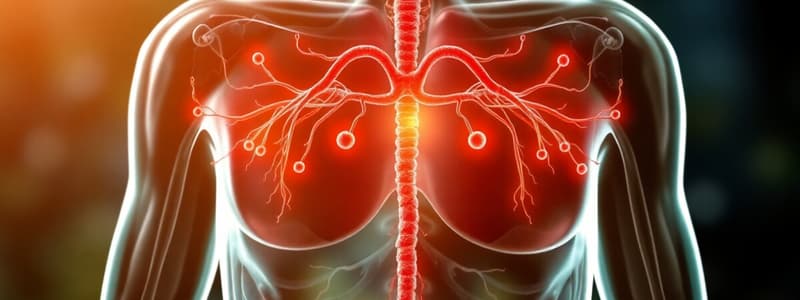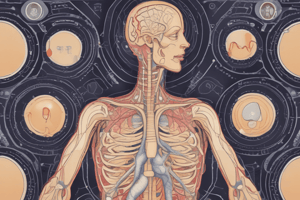Podcast
Questions and Answers
What is the name of the chemical messengers used by the endocrine system?
What is the name of the chemical messengers used by the endocrine system?
Hormones
What are the primary functions of the endocrine system?
What are the primary functions of the endocrine system?
- Transport of oxygen and carbon dioxide throughout the body
- Digestion and absorption of nutrients
- Removal of waste products from the body
- Regulation of major processes like reproduction, growth, and metabolism (correct)
What type of chemical messengers are produced by specialized cells of the endocrine system?
What type of chemical messengers are produced by specialized cells of the endocrine system?
- Neurotransmitters
- Antibodies
- Enzymes
- Hormones (correct)
Hormones are released directly into the target cells.
Hormones are released directly into the target cells.
Hormones can only affect specific tissues or organs (target cells or organs).
Hormones can only affect specific tissues or organs (target cells or organs).
What type of protein receptors must target cells have to respond to specific hormones?
What type of protein receptors must target cells have to respond to specific hormones?
What are the two primary types of hormones based on their chemical structure?
What are the two primary types of hormones based on their chemical structure?
Which of the following is NOT an example of an amino acid-based hormone?
Which of the following is NOT an example of an amino acid-based hormone?
Prostaglandins are made from cholesterol.
Prostaglandins are made from cholesterol.
What is the main function of mineralocorticoids like aldosterone?
What is the main function of mineralocorticoids like aldosterone?
Glucocorticoids like cortisol promote normal cell metabolism and help resist long-term stressors.
Glucocorticoids like cortisol promote normal cell metabolism and help resist long-term stressors.
What hormone is produced by the adrenal medulla in response to short-term stress?
What hormone is produced by the adrenal medulla in response to short-term stress?
What is the role of insulin in blood sugar regulation?
What is the role of insulin in blood sugar regulation?
What is the role of glucagon in blood sugar regulation?
What is the role of glucagon in blood sugar regulation?
Where is the pineal gland located?
Where is the pineal gland located?
What is the main function of the thymus gland?
What is the main function of the thymus gland?
Where are the ovaries located?
Where are the ovaries located?
Progesterone is produced by the corpus luteum after ovulation.
Progesterone is produced by the corpus luteum after ovulation.
What is the primary function of testosterone?
What is the primary function of testosterone?
The placenta produces hCG, estrogen, and progesterone during pregnancy.
The placenta produces hCG, estrogen, and progesterone during pregnancy.
Most endocrine glands function optimally from birth until old age.
Most endocrine glands function optimally from birth until old age.
Flashcards
What is the endocrine system?
What is the endocrine system?
The endocrine system is a network of glands that secrete hormones directly into the bloodstream, acting as a second messenger system within the body.
What are hormones?
What are hormones?
Hormones are chemical messengers produced by specialized cells, secreted into the bloodstream, and carrying signals to target cells or organs.
What are target cells?
What are target cells?
Target cells or organs possess specific protein receptors that bind to hormones, triggering a response within the cell.
What are the major classes of hormones?
What are the major classes of hormones?
Signup and view all the flashcards
What roles do hormones play in the body?
What roles do hormones play in the body?
Signup and view all the flashcards
How are hormone levels regulated?
How are hormone levels regulated?
Signup and view all the flashcards
What is a hormonal stimulus for hormone release?
What is a hormonal stimulus for hormone release?
Signup and view all the flashcards
What is a humoral stimulus for hormone release?
What is a humoral stimulus for hormone release?
Signup and view all the flashcards
What is the pituitary gland?
What is the pituitary gland?
Signup and view all the flashcards
What is the anterior pituitary?
What is the anterior pituitary?
Signup and view all the flashcards
What is the posterior pituitary?
What is the posterior pituitary?
Signup and view all the flashcards
What is growth hormone (GH)?
What is growth hormone (GH)?
Signup and view all the flashcards
What is prolactin (PRL)?
What is prolactin (PRL)?
Signup and view all the flashcards
What is adrenocorticotropic hormone (ACTH)?
What is adrenocorticotropic hormone (ACTH)?
Signup and view all the flashcards
What is thyroid-stimulating hormone (TSH)?
What is thyroid-stimulating hormone (TSH)?
Signup and view all the flashcards
What are gonadotropic hormones?
What are gonadotropic hormones?
Signup and view all the flashcards
What is follicle-stimulating hormone (FSH)?
What is follicle-stimulating hormone (FSH)?
Signup and view all the flashcards
What is luteinizing hormone (LH)?
What is luteinizing hormone (LH)?
Signup and view all the flashcards
What is oxytocin?
What is oxytocin?
Signup and view all the flashcards
What is antidiuretic hormone (ADH)?
What is antidiuretic hormone (ADH)?
Signup and view all the flashcards
What is the thyroid gland?
What is the thyroid gland?
Signup and view all the flashcards
What is thyroid hormone?
What is thyroid hormone?
Signup and view all the flashcards
What is calcitonin?
What is calcitonin?
Signup and view all the flashcards
What are the parathyroid glands?
What are the parathyroid glands?
Signup and view all the flashcards
What are the adrenal glands?
What are the adrenal glands?
Signup and view all the flashcards
What are mineralocorticoids?
What are mineralocorticoids?
Signup and view all the flashcards
What are glucocorticoids?
What are glucocorticoids?
Signup and view all the flashcards
What is the adrenal medulla?
What is the adrenal medulla?
Signup and view all the flashcards
What is the pancreas?
What is the pancreas?
Signup and view all the flashcards
What is insulin?
What is insulin?
Signup and view all the flashcards
What is glucagon?
What is glucagon?
Signup and view all the flashcards
What is the pineal gland?
What is the pineal gland?
Signup and view all the flashcards
What is the thymus?
What is the thymus?
Signup and view all the flashcards
What are the ovaries?
What are the ovaries?
Signup and view all the flashcards
What are estrogens?
What are estrogens?
Signup and view all the flashcards
What is progesterone?
What is progesterone?
Signup and view all the flashcards
What are the testes?
What are the testes?
Signup and view all the flashcards
What is testosterone?
What is testosterone?
Signup and view all the flashcards
What is the placenta?
What is the placenta?
Signup and view all the flashcards
Study Notes
The Endocrine System
- The endocrine system is a second messenger system using chemical messages (hormones) released into the bloodstream.
- Hormones control critical bodily processes including reproduction, growth, development, immune response, homeostasis, and metabolism.
Hormone Overview
- Specialized cells produce hormones.
- Cells release hormones into extra cellular fluids then transferred to target cells via the bloodstream.
- Hormones regulate the activity of other cells.
Hormone Chemistry
- Amino acid-based hormones include proteins, peptides, and amines.
- Steroids are derived from cholesterol.
- Prostaglandins are derived from highly active lipids.
Mechanisms of Hormone Action
- Hormones affect specific target tissues or organs.
- Target cells possess specific protein receptors.
- Hormone binding influences cellular function.
Control of Hormone Release
- Negative feedback mechanisms maintain stable hormone levels in the blood.
- Stimulus or low hormone levels trigger hormone release.
- Hormone release ceases when target levels are reached.
Hormonal Stimuli of Endocrine Glands
- Some glands are activated by other hormones; a hormone cascade.
- Changing blood levels of ions (e.g., calcium) trigger hormone release.
Location of Major Endocrine Organs
- Pituitary gland: size of grape, hangs from hypothalamus, protected by sphenoid bone.
- Has two lobes: anterior (glandular) and posterior (nervous).
- Other organs include pineal, thyroid, parathyroid, thymus, adrenal, pancreas, ovaries, testes. Locations are noted on the included diagrams.
Hormones of the Anterior Pituitary
- Six anterior pituitary hormones affect non-endocrine targets or stimulate other endocrine glands (tropic).
- Hormones are proteins/peptides, act through secondary messenger systems, and are regulated mainly by negative feedback.
- Examples include growth hormone (GH), adrenocorticotropic hormone (ACTH), prolactin (PRL), follicle-stimulating hormone (FSH), luteinizing hormone (LH), and thyroid-stimulating hormone (TSH).
Growth Hormone (GH)
- A general metabolic hormone affecting skeletal muscle growth.
- Influences amino acid incorporation into proteins and mobilization of fats for energy production.
- Stimulated by growth hormone-releasing hormone (GHRH) and inhibited by growth hormone-inhibiting hormone (GHIH).
Functions of Other Anterior Pituitary Hormones (e.g., Prolactin)
- Prolactin (PRL): Stimulates and maintains milk production after childbirth; function in males is unknown.
- Regulated by prolactin-releasing hormone (PRH) and prolactin-inhibiting hormone (PIH).
- Others (ACTH, TSH, FSH, LH) have specific effects on other hormone-producing glands.
Hormones of the Adrenal Cortex
- Mineralocorticoids (chiefly aldosterone): Regulate mineral balance in electrolytes, water, and blood pressure. Controlled by renin and aldosterone; inhibited by atrial natriuretic peptide (ANP).
- Glucocorticoids (cortisone and cortisol): Important for metabolic functions and stress response. Released in response to increased blood ACTH levels.
- Sex hormones (androgens, some estrogens): Produced in the inner adrenal cortex; influence secondary sex characteristics.
Hormones of the Adrenal Medulla
- Produces epinephrine and norepinephrine (catecholamines).
- Catecholamines prepare the body to deal with short-term stress.
Pancreatic Islets
- Insulin: allows glucose uptake from beta cells into blood
- Glucagon: Allows glucose release from alpha cells into the blood.
- Maintain blood glucose homeostasis.
Pineal Gland
- Located in the brain, secretes melatonin, influencing wake/sleep cycles.
Thymus
- Located near the sternum, large in children, secretes thymosin—a crucial component of the developing immune system.
Hormones of the Ovaries
- Estrogens: produced by Graafian follicles, stimulate female secondary sex characteristics and reproduction, help maintain pregnancy and preparing breasts for milk production.
- Progesterone: Produced by the corpus luteum, plays a role in the menstrual cycle and embryo implantation.
Hormones of the Testes
- Interstitial cells produce androgens (primarily testosterone).
- Testosterone promotes male secondary sex characteristics, reproductive development, and sperm production.
Other Hormone-Producing Tissues/Organs
- Various tissues and organs (e.g., parts of the small intestine, stomach, kidneys, heart) contain scattered endocrine cells that produce hormones.
- The placenta, a temporary endocrine gland, produces hormones (including HCG) during pregnancy.
- Various factors affect hormone function. Aging and lack of efficient hormone production cause significant physiological and metabolic changes.
Studying That Suits You
Use AI to generate personalized quizzes and flashcards to suit your learning preferences.




